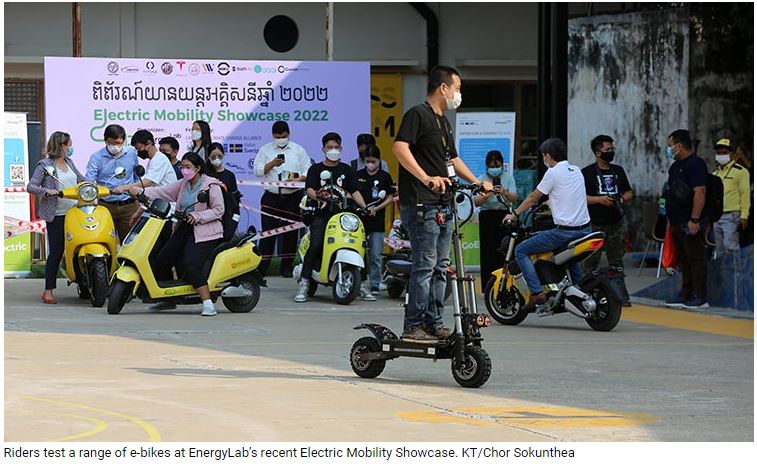Cambodia: Phnom Penh food delivery riders gear up to go electric
Phnom Penh’s delivery drivers are starting to contribute to a cleaner Cambodia as FoodPanda and Nham24 riders take to electric motorbikes to transport food around the capital.
FoodPanda signed a memorandum of understanding in November with e-bike manufacturer Oyika, which operates the Go2 bike rental service in the Cambodian capital. FoodPanda agreed to promote e-bikes to its riders. Ten of the top riders attended a workshop organised by the bike maker to discuss climate change, the pros of petrol-free driving and the economics of electric bikes.
“We addressed how battery swapping was the solution to the range anxiety and long charging time issues that would otherwise make electric motorbikes incompatible with the delivery market,” said Oyika Co-Founder and President Carl Wong.
Following the course 30 FoodPanda riders decided to rent e-bikes directly from Oyika.
“There are currently a backlog of FoodPanda riders waiting for rental bikes from Oyika due to a current shortage of batteries which we are addressing,” Wong said, adding that e-bikes are now more affordable than an internal combustion engine (ICE) powered motorcycle.
“The electricity cost, the battery and swap infrastructure cost and the cost of maintenance all rolled into a monthly subscription fee is less than the petrol cost of an ICE motorbike. That’s excluding fuel, maintenance and depreciation of the ICE bike,” he said.
After FoodPanda riders started electric-powered deliveries, Oyika said it was approached by riders from GoodToGo, Nham24 and other delivery companies, who joined the rental programme. Oyika is also in talks with Reliance. The new entrant to the food delivery scene has partnered with Britain’s Myda, which gives Cambodian stores a marketplace to display their goods. Reliance is also eager to persuade its riders to use e-bikes, Wong said.
Nham24 Co-Founder and Chief Executive Officer Borima Chann confirmed to Khmer Times that his company is interested in greener delivery options.
“We have explored this e-bike for a while and have tested them with our top delivery riders,” he said. “We are working with relevant partners to define the optimal model to encourage our riders to switch to e-delivery.”
Most delivery companies use an asset-light business model to keep the cost of a fleet of bikes off the balance sheet. Riders are paid a salary, and sometimes a commission, to cover the operating and depreciation costs of their vehicles. That strategy means Oyika will continue to focus on persuading riders to go green rather than trying to get companies to invest in fleets of e-bikes.
Electric mobility got a boost this month when Transport Minister Sun Chanthol said the government wanted to see a switch to 40 percent electric cars and 30 percent electric motorbikes by 2050. He also said he wanted food deliver firms to swich to e-bikes.
“It’s heartening to see the Transport Minister providing his backing for electric motorbikes,” Wong said. “The Ministry of Public Works and Transport recently asked for quotations for electric motorbikes for use within the Ministry and we hope to see MPWT and other ministries lead from the front by adopting EVs across their fleets.”
Oyika believes that the migration from ICE to EV will only gather speed when the reason to change moves from being economically viable to economically compelling, Wong said. He said the government could hasten this change by cutting petrol subsidies or removing taxes on EVs but Oyika also has an eye on ways to cut the cost of an e-bike and end range anxiety.
“Battery prices continue to fall and we as a company continue to seek ways to reduce our prices,” Wong said. “Early in the second quarter we will release a new e-motorbike and battery swap package that will effectively reduce the capex offering our customers – purchases not rentals – savings of approximately 50 percent compared to our current package. With this we also expect to increase our battery swap network from the current 11 swap stations to 32 in Q2 and have manufactured sufficient batteries to alleviate our current shortage.”
Ride hailing service MVL TADA is also moving into the e-bike market, planning to produce electric scooters at its assembly plant near Phnom Penh. Head of EV David Ly told Khmer Times the company has not reached out to delivery riders yet as the company is still focusing on ONiON T1 electric tuktuks, after it started handing out the keys of the three-wheelers to TADA drivers last week.
Source: https://www.khmertimeskh.com/501031477/phnom-penh-food-delivery-riders-gear-up-to-go-electric/


 Thailand
Thailand




